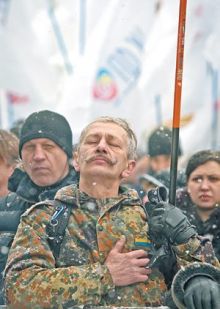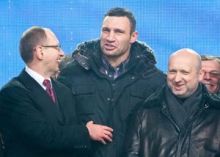On the eve of Sobornist (Unity) Day we wondered how much politics and how much holiday as such there will be. Arsenii Yatseniuk’s Front of Changes quite adequately dealt with the organizational side of the announced unification of the opposition. It was easy to see. The people with Front symbols stood from Shevchenko Park to St. Sophia Square. Compared to other political forces, they constituted a considerable part. In general, there were very many symbols. Sometimes they irked the passers-by. It was difficult even for the initiated to make out what is what in this gamma of colors and slogans. Besides, when it comes to unification, it is unlikely that each party’s personification and advertisement will do any good.
“Who do you represent?” we asked a man who held a flag with the symbols of the USDP now led by Natalia Korolevska. “The Social Democratic Party!” he answered. (By the way, he was under the influence.) “And who is its leader?” was our next question. “God knows who,” he said and went away. After all, paid-up protesters accounted for about 70 percent of all those present. The next largest contingent was the extremely devout people. For example, when Turchynov was reading out Tymoshenko’s address on the occasion of Sobornist Day, somebody was standing by and crying. “See what they’re doing to her… I’m so much sorry for her… I can’t…” a woman said, with tears in her eyes. There were also people who were not indifferent to the holiday itself and were in opposition to the current leadership. It is they who emphasized that “all these statements of the opposition are, of course, very good, but the question is how this will be put into practice.”
After all, it is so far difficult to answer this question. In particular, the message of a recent comment to The Day by the sociologist Iryna Bekeshkina boiled down to the following: things are OK now, but when it comes to nominating concrete candidates from first-past-the-post constituencies, some problems may arise, especially in eastern Ukraine, where the opposition will find it very difficult to go through.
Consolidated lists of candidates are one of the items in the Agreement on Joint Actions of the United Opposition signed on Sobornist Day. The oppositionists:
“– shall coordinate the common principles and approaches which they will adhere to in the 2012 parliamentary elections;
– shall make a concerted effort to ensure the preparation and holding of a fair election of the People’s Deputies of Ukraine and the finding of their true results, to prevent election rigging and distortion of the free expression of popular will. This also means the coordination of candidates for district and poll-station electoral commissions and observers, as well as making provisions for their effective work;
– shall form a consolidated list of candidate People’s Deputies of Ukraine who will be running in first-past-the-post constituencies by the principle “one constituency – one candidate from the United Opposition; shall recognize integrity, principled approach, professionalism, civic prestige, and untarnished reputation as basic requirements for candidates;
– after winning the 2012 elections, the United Opposition shall form a parliamentary majority and begin the process of forming a new Ukrainian government.”
At present, the opposition’s backbone is composed of the highest-rated Fatherland and Front of Changes, which have sided with Freedom because it enjoys a high rating in the western regions. This alliance is likely to incorporate some other, smaller, forces, as the elections approach. The abovementioned parties have been repeatedly saying that they will agree upon common candidates in the first-past-the-post constituencies. But it is not clear whether the voters will believe them. The leaders of these political forces said nothing new on Sobornist Day. Their speeches sounded as usual and their ideas looked rather archaic. It is unclear how all this will be put into practice, especially if we take into account the considerable weariness caused by the opposition (and, naturally, by the government). Undoubtedly, there is something behind the aforesaid opposition parties, but they look passive.
Although Vitali Klitschko finally signed the Agreement (with reservations) on that day, it looks like another opposition column is being formed on the basis of UDAR, his political force. UDAR’s rating has been steadily improving lately. Incidentally, Klitschko delivered a brief, but meaningful, speech. In general, he looked modern in comparison with the others. “The Ukrainians must stand up for democratic values which the government is now trying to destroy. Both Yurii Lutsenko and Yulia Tymoshenko must take part in the next parliamentary elections. I know like nobody else that there can be no victory without a struggle. We will only be able to win if we stand together. For we believe in our strength, in Ukraine… We are convinced that the opposition parties should hold a public debate today on the contents of this document – in particular, about the need to apply the quota principle, the mechanisms of finding and nominating a common candidate, the open lists, etc. This Agreement should lay down specific mechanisms for further work. It is voters themselves, not party leaders, who should choose opposition candidates in the next Verkhovna Rada elections,” he said.
So we can say, answering the question we asked in the beginning, that we gained mixed impressions. We could feel falsity, although the feeling of a holiday accounted for about 30 percent. The opposition seems to lack something: they are still suffering from sort of a post-Orange-Revolution syndrome. The only one who stands clear of this syndrome is Klitschko. He seems to be able to reap good votes, for he is the embodiment of something new. But it depends on him how to make use of this.








